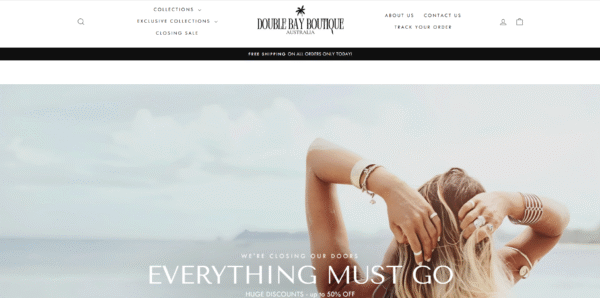Online shoppers are urged to take greater care, the ACCC says. Photo: stock
The Australian Competition and Consumer Commission (ACCC) is warning the public to beware of four online ‘ghost stores’.
The commission says the four websites make false claims that they are Australian businesses about to close and are selling high-quality clothing and footwear products.
They are based overseas, not soon closing down and are drop-shipping low-quality products, the commission adds.
PUBLIC WARNING
> The ACCC is warning about the following websites: everly-melbourne.com, willowandgrace-adelaide.com, sophie-claire.com and doublebayboutique.com.
“We are warning Australians about the risks of engaging with these four websites specifically, which we allege are not based in Melbourne, Adelaide or Double Bay, nor are they imminently closing down,” ACCC deputy chairwoman Catriona Lowe says.
It says the warnings follow an increase in complaints about online ghost stores; since January, it says it received at least 360 reports about 60 online retailers.
The ACCC says it is also aware that ghost stores are refusing to provide refunds or only offering partial refunds or not even responding to complaints.
Ghost stores target consumers through social media ads, and tend to close and rebrand under new names, often using suburbs, towns or cities in their names to appear ‘local’.
WIDESPREAD CONCERNS
The ACCC worries that this behaviour is more widespread than four websites.
“We urge all Australians to think twice before clicking on ads they see on social media which claim to be from a boutique business based in a local town or city,” Lowe says.

One of the ‘ghost store’ websites that the ASCC is warning about. Photo: supplied
“Often ghost stores will share an emotional story on their social media or website that they are a small, locally operated business, needing to close for financial reasons.”
“They will claim they are having a ‘closing down sale’ as a result, with all stock heavily discounted and available on a very limited basis,” she says.
“This conduct preys on the empathy of consumers who have a genuine desire to support local businesses, as well as creating a false sense of urgency.”
“The websites often use a similar format to many other online stores, advertising high-quality boutique clothing at heavily discounted prices,” Lowe says.
“However, when the product arrives in the mail, consumers report receiving cheap, mass-produced products that have been sold at an inflated price and do not fit their advertised quality or description,” she says.
Ghost stores sometimes use a name similar to that of a genuine local boutique, leading to competitive and reputational harm for those businesses.
The ACCC understands ghost stores use targeted paid advertisements on social media sites such as Facebook and Instagram and often appear to use the Shopify e-commerce platform.
“We have written to Meta Platforms (the owner of Facebook and Instagram) and Shopify to request they scrutinise and take appropriate action against the operators of ghost stores,” Lowe says.
“We want to increase public awareness of these businesses so that Australians know how to spot them and can avoid being deceived into buying an inferior product.”
The website can be reported to Google to have it delisted and a report made to the ACCC; click here for the page. Websites can also be reported to ScamWatch.
- The store may have an Australian place in its name or domain but the website domain is ‘.com’ and not ‘.com.au’.
- The website often features a fake backstory about the owners and claims that, for financial or other reasons, the store is closing down. Social media ads often claim a closing down sale ‘ends tonight’.
- Use of AI generated images of the owners or team. This can sometimes be seen in the URL; look for the term ‘generated_image.jpg’.
- The returns policy on the website often suggests that items need to be returned to a warehouse or location overseas different from where they were shipped from.
- The website does not provide a contact phone number, physical address or any contact details beyond an email address or web form.
- The website’s Privacy Policy or Terms of Service refers to international laws and regulations.
- The website does not provide an Australian Business Number or Australian Company Number.
- Review platforms often have negative reviews for the business, but the business’ website has only very positive reviews.
- The business’ Facebook page was only created recently, and its posts have negative reviews or lots of negative emoji reactions.
- Images of products may be taken from other websites.
Source: ACCC





